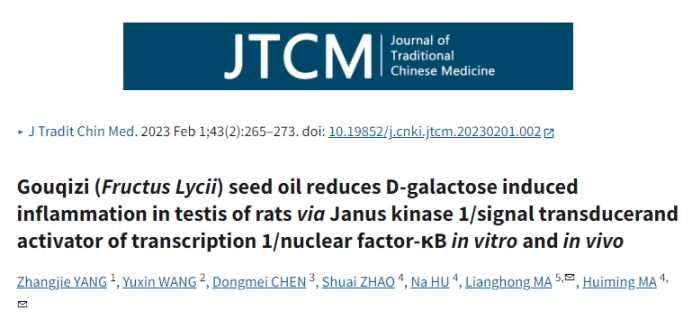马会明等人在《Journal of traditional Chinese medicine》上发表题为“Gouqizi (Fructus Lycii) seed oil reduces D-galactose induced inflammation in testis of rats via Janus kinase 1/signal transducerand activator of transcription 1/nuclear factor-κB in vitro and in vivo” 的论文。

Abstract
OBJECTIVE:
To investigate the efficacy of Gouqizi (Fructus Lycii) seed oil (FLSO) on D-gal induced inflammation in testis of rats in vitro and in vivo.
METHODS:
In aging Sertoli cells (TM4 cells) induced by D-galactose (D-gal), the expression of upregulated aging-related proteins. The number of cells counted by cell counting kit (CCK)-8 assay showed a high number of cells disposed with FLSO at 50, 100 and 150 μg/mL compared to that for the aging model. In vivo, male Sprague-Dawley rats (n = 50, 8-week-old, 230-255 g) were randomly categorized into control, aging model, and FLSO (low-, medium-, and high-dose) groups. The expression of nuclear factor-κB (NF-κB) and its upstream factors [Janus kinase 1 (JAK1) and signal transducerand activator of transcription 1 (STAT1)] was detected by Western blot and immunofluorescence, related inflammatory factors quantified by enzyme-linked immunosorbent assay. Evaluation of testicular tissue by Johnsen score, the spermatogenic function was explored.
RESULTS:
The expression of interleukin-1β (IL-1β) (P < 0.05), IL-6 (P < 0.001), and tumor necrosis factor α (TNF-α) (P < 0.05) was decreased significantly, while that of heme oxygenase-1 (HO-1) (P < 0.001) and IL-10 (P < 0.05) was increased in cells disposed with FLSO 100 μg/mL. FLSO inhibited the expression of NF-κB and declined p-p65/p65 (P < 0.01), as detected by Western blotting. In vivo, the levels in serum of IL-1β (P < 0.001), IL-6 (P < 0.05), and TNF-α (P < 0.01) declined while IL-10 (P < 0.05) was upregulated post-FLSO treatment. In addition, the expression of JAK-1 and STAT1 increased significantly in testicular tissue of rats treated with FLSO as compared to the aging model of rats (P < 0.001), while the expression of NF-κB (P < 0.001) declined in the testis in the FLSO group, as assessed by immunofluorescence. The levels of inhibor B and testosterone in serum both increased (P < 0.05).
CONCLUSIONS:
In conclusion, this study determined the protective effects of FLSO to tolerate inflammatory injury in the testis, indicating that FLSO alleviates inflammation via JAK-1/STAT1/NF-κB pathway.
